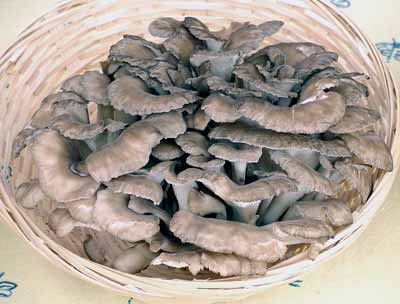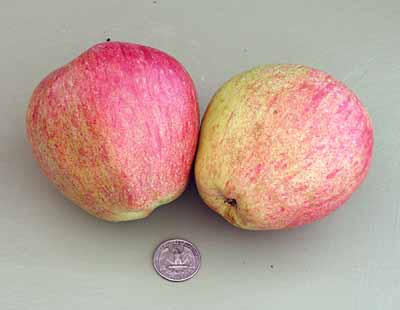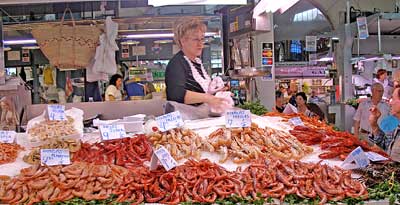
Hen of the woods or maitake mushroom. A frilled fungus with many caps that grows on trees and which is edible when it is very young.

A variety of red flushed cooking apple raised in Surrey and known from 1951. It cooks to a purée. This mid-season variety is harvested from mid-September in South-East England and is at its best from September to October.
Sheep's or field sorrel is a wild plant producing leaves with a lemony, tangy flavour good in salads. The leaves are small and shaped like baby spinach leaves, with those in the north smaller than sorrel found elsewhere in Europe.
Shelagh is a main crop Scottish potato with cream flesh and skin with a tinge of pink in the eyes. Waxy. Can be boiled or steamed.

Shellfish is a general term for crustaceans and fish with shells. This includes prawns (US: shrimp) crab and lobsters, as well as mussles and clams and the like. In western Europe there is general advice not to eat filter-feeding or bivalve shellfish, such as oysters, mussels and clams, unless there is an 'r' in the month. This would exclude eating them in May, June, July and August. This is generally felt to be because they may be in their breeding season and the flavour becomes milky and weak as energies are put into other things than their own meats at this time. However, Frank Evans of North Shields in a letter to the Guardian, says that the 'real reason is that filter-feeding shellfish may have consumed toxic flagellates sieved from the plankton during those months. The bivalves, when eaten, can cause paralytic shellfish poisoning. It is safe to eat lobsters, crabs and winkles, which are not filter feeders, at any time." I wonder if is something to do with increased marine temperatures at this time of year which makes the presence of toxic flagellates more prevalent, and whether this means that global warming and the subsequent warming of the oceans may make it impossible to eat such delights in the future.
A traditional British dish, with many variations throughout the world, in which minced (US: ground) lamb, frequently left over from the 'Sunday joint', is seasoned and mixed with onions and then topped with mashed potato and baked. The surface of the potato is usually roughed up with a fork, drawn up into little peaks which blacken during the baking. Modern versions are likely to be much more elaborate and tasty.
The seeds, leaves, and root of shepherd's purse are edible. It is a rather scraggy plant which grows wild. In Greece it is used to bulk up dishes in the absence of other greens. In Korea the roots may be used in the traditional vegetable dish of namul. In Japan it is included as one of those early spring vegetables in a symbolic special festival called nanakusa-no-sekku. And it is routinely used stir fried with rice cakes or as an ingredient in wontons in the Jiangnan region of China.